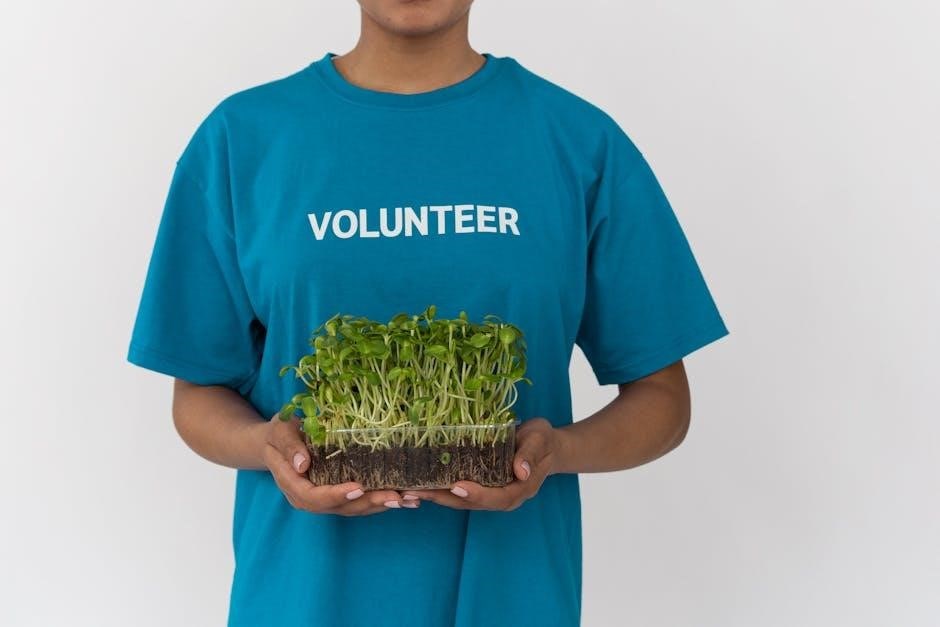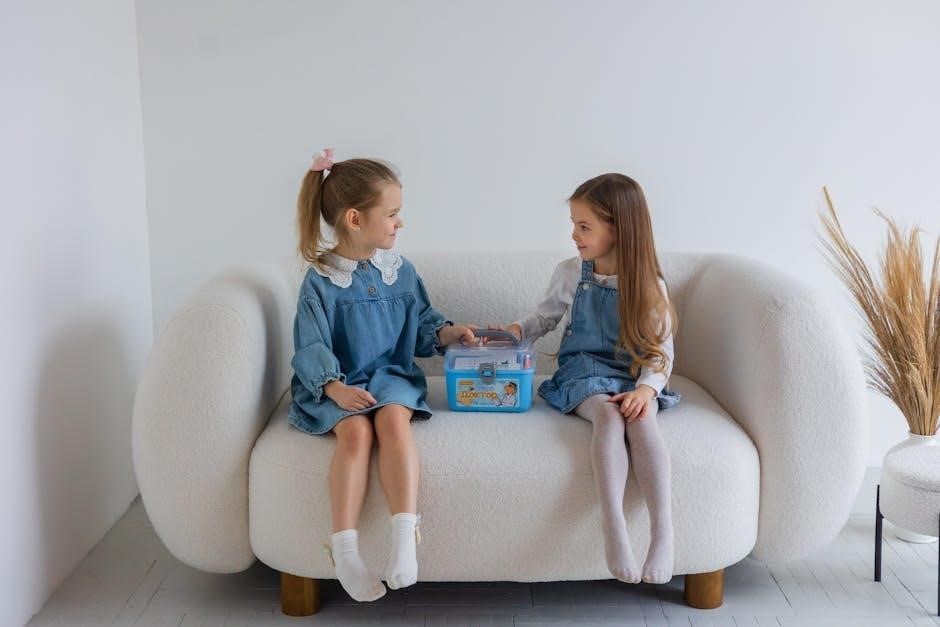Understanding Puberty
Understanding Puberty is a crucial phase marked by physical‚ emotional‚ and mental growth․ It involves self-awareness‚ hormonal changes‚ and emotional adjustments‚ helping girls navigate this transition with confidence․
1․1 Physical Changes in Girls
During puberty‚ girls experience significant physical changes‚ including breast development‚ growth spurts‚ and the onset of menstruation․ Hormonal shifts lead to wider hips‚ body fat redistribution‚ and the appearance of pubic and underarm hair․ These changes can occur at different paces for each girl‚ but they are natural and essential for reproductive development․ Understanding and embracing these transformations helps girls maintain confidence and a positive body image during this transition․
- Growth spurts may result in increased height and changes in body proportions․
- Menstruation preparation is crucial‚ including hygiene practices and emotional readiness․
- Body changes vary individually‚ and patience is key during this process․
1․2 Onset and Stages of Puberty
Puberty in girls typically begins between ages 8 and 13‚ triggered by hormonal changes․ The process unfolds in stages‚ starting with breast budding‚ followed by growth spurts‚ and eventually menstruation․ Each stage progresses at an individual pace‚ influenced by genetics and overall health․ Understanding the sequence helps girls anticipate and adapt to these changes‚ fostering confidence and readiness for the transition to adulthood․
- The onset varies widely among girls but generally starts with breast development․
- Growth spurts often occur mid-puberty‚ leading to increased height and body changes․
- Menstruation typically begins 1-2 years after breast budding‚ marking a key milestone․
1․3 Hygiene and Care During Puberty
Puberty brings significant changes‚ making proper hygiene essential․ Girls should shower daily‚ using mild soap and shampoo‚ and wear clean clothes․ Menstrual hygiene is crucial—sanitary products should be changed regularly‚ and hands washed before handling them․ Deodorant or antiperspirant can help manage body odor․ Keeping nails clean and practicing good dental hygiene also supports overall health․ These habits help maintain confidence and prevent discomfort during this transition․
- Daily bathing with gentle products promotes cleanliness and comfort․
- Menstrual products should be changed every 4-8 hours to prevent infections․
- Practicing good hand hygiene before handling menstrual products is vital․
1․4 Menstrual Health and Management
Menstrual health is vital for girls during puberty․ Understanding the menstrual cycle‚ which typically lasts 21-35 days‚ helps manage periods effectively․ Using sanitary pads‚ tampons‚ or menstrual cups ensures hygiene and comfort․ Changing products regularly prevents infections and odors․ Emotional well-being is also key—tracking cycles and staying prepared can reduce stress․ Open conversations with trusted adults or healthcare providers are encouraged for support and guidance․
- Track your cycle to anticipate and prepare for periods․
- Change sanitary products every 4-8 hours to maintain hygiene․
- Seek advice from trusted adults or professionals for concerns․

Emotional and Mental Health
Emotional and mental health during puberty is crucial․ Girls experience mood swings‚ self-esteem shifts‚ and stress due to hormonal changes․ Practicing mindfulness‚ open communication‚ and positive self-talk helps build resilience and emotional stability․ Seeking support from trusted adults or professionals is key to navigating these challenges effectively․
- Engage in activities that promote self-expression and relaxation․
- Build a support network of friends‚ family‚ or mentors․
- Practice mindfulness to manage stress and anxiety․
2․1 Building Self-Esteem
Building self-esteem is essential during puberty․ Girls often face body image issues and self-doubt due to societal pressures and physical changes․ Encouraging positive affirmations‚ recognizing strengths‚ and fostering a supportive environment can help․ Parents and peers should promote self-acceptance and celebrate individuality․ Setting realistic goals and acknowledging achievements‚ no matter how small‚ boosts confidence․ Teaching girls to embrace their uniqueness and focus on their abilities rather than flaws helps develop a healthy self-image․ Self-esteem is a journey that requires patience‚ kindness‚ and consistent encouragement․ Surrounding themselves with positive influences is key to long-term confidence․
- PRACTICE DAILY AFFIRMATIONS TO REINFORCE SELF-WORTH․
- FOCUS ON STRENGTHS RATHER THAN WEAKNESSES․
- CELEBRATE ACHIEVEMENTS TO BUILD CONFIDENCE․
2․2 Managing Stress and Anxiety
Managing stress and anxiety is vital for emotional well-being․ Techniques like deep breathing‚ journaling‚ and physical activity can help alleviate tension․ Encourage open conversations with trusted adults or friends to share feelings․ A consistent routine‚ including balanced meals and adequate sleep‚ supports mental health․ Positive self-talk and mindfulness practices‚ such as meditation‚ can reduce anxiety․ Teaching problem-solving skills empowers girls to handle challenges confidently․ Remember‚ seeking help is a sign of strength‚ not weakness․ Building resilience helps navigate life’s ups and downs with greater ease․
- PRACTICE RELAXATION TECHNIQUES LIKE DEEP BREATHING․
- ENGAGE IN REGULAR PHYSICAL ACTIVITY TO REDUCE STRESS․
- ESTABLISH A DAILY ROUTINE FOR STABILITY․
2․3 Importance of Mental Health Resources
Mental health resources play a vital role in supporting girls through emotional challenges․ Access to professional help‚ such as counselors or therapists‚ can provide guidance and coping strategies; Hotlines‚ online support groups‚ and educational websites offer additional layers of assistance․ Encouraging open conversations about mental health reduces stigma and promotes seeking help․ These resources empower girls to manage stress‚ anxiety‚ and other emotional struggles effectively‚ fostering resilience and overall well-being․ Remember‚ seeking support is a sign of strength‚ not weakness․
- SEEK HELP FROM COUNSELORS OR THERAPISTS․
- UTILIZE HOTLINES OR ONLINE SUPPORT GROUPS․
- EXPLORE EDUCATIONAL WEBSITES FOR MENTAL HEALTH TIPS․
2․4 Developing Emotional Intelligence
Emotional intelligence is the ability to recognize‚ understand‚ and manage your own emotions and those of others․ It plays a key role in building strong relationships and making thoughtful decisions․ Developing this skill helps girls communicate effectively‚ empathize with others‚ and navigate social situations confidently․ Practicing self-awareness‚ active listening‚ and expressing feelings respectfully fosters emotional growth and resilience․ Encouraging open conversations and seeking feedback can further enhance emotional intelligence‚ empowering girls to handle challenges with maturity and compassion;
- PRACTICE SELF-AWARENESS AND EMPATHY․
- ENGAGE IN ACTIVE LISTENING․
- EXPRESS FEELINGS RESPECTFULLY․
Social Relationships and Communication
Social relationships are vital for girls‚ fostering empathy‚ trust‚ and understanding․ Effective communication skills guide them in navigating friendships‚ resolving conflicts‚ and building meaningful connections with others․
- NAVIGATE FRIENDSHIPS WITH EMPATHY․
- DEVELOP CLEAR COMMUNICATION SKILLS․
- LEARN TO RESOLVE CONFLICTS RESPECTFULLY․
3․1 Navigating Friendships
Navigating friendships during growth involves building trust‚ empathy‚ and loyalty․ Girls learn to communicate openly‚ resolve conflicts respectfully‚ and balance fun with emotional support․ Healthy friendships foster confidence and teamwork‚ while teaching boundaries and mutual respect․ Understanding others’ perspectives helps in creating strong‚ lasting bonds․ Empathy and kindness are key to nurturing meaningful relationships․ Learning to handle disagreements and celebrate differences strengthens friendships‚ preparing girls for lifelong connections․
- EMPATHIZE WITH FRIENDS’ FEELINGS․
- RESPECT BOUNDARIES IN RELATIONSHIPS․
- CELEBRATE DIVERSITY AND INCLUSIVITY․
3․2 Effective Communication Skills
Effective communication involves clearly expressing thoughts and actively listening to others․ It helps girls build strong relationships‚ resolve conflicts‚ and express emotions confidently․ Practicing empathy and clarity fosters understanding and trust․ Learning to articulate feelings and opinions respectfully is vital for personal and social growth․ Open dialogue strengthens bonds and promotes mutual respect․ Girls can navigate conversations with confidence by being honest‚ attentive‚ and considerate of others’ perspectives․
- LISTEN CAREFULLY TO OTHERS’ VIEWS․
- EXPRESS YOUR THOUGHTS CLEARLY․
- USE NON-VERBAL CUES LIKE EYE CONTACT․
3․3 Handling Peer Pressure
Handling peer pressure is a vital skill for girls to master during their growth․ It involves staying true to personal values while navigating social influences․ Peer pressure can lead to positive or negative outcomes‚ so it’s crucial to recognize its impact․ Girls should learn to say “no” confidently‚ surround themselves with supportive friends‚ and seek guidance from trusted adults when needed․ Building self-confidence and understanding the consequences of decisions helps resist unhealthy pressures and fosters resilience․
- STAY TRUE TO YOUR VALUES․
- CHOOSE FRIENDS WISELY․
- SEEK ADULT SUPPORT WHEN NEEDED․

Education and Future Planning
Education and future planning empower girls to set goals‚ explore career paths‚ and prepare for lifelong success․ It fosters skills‚ confidence‚ and a vision for their future․
- SET CLEAR GOALS․
- EXPLORE CAREER OPPORTUNITIES․
- DEVELOP SKILLS FOR SUCCESS․
4․1 Importance of Academic Achievement
Academic achievement is a cornerstone of personal and professional growth․ It provides a strong foundation for critical thinking‚ problem-solving‚ and lifelong learning․ Girls who excel academically gain confidence‚ resilience‚ and a competitive edge in their future endeavors․ Education opens doors to opportunities‚ fosters creativity‚ and prepares individuals to navigate an ever-evolving world․ By prioritizing learning and staying committed to their studies‚ girls can unlock their full potential and achieve their dreams․ Academic success is not just about grades; it’s about building a mindset for success․
- Provides a strong foundation for future success․
- Encourages critical thinking and creativity․
- Builds confidence and resilience․
- Opens doors to career and educational opportunities․
4․2 Setting and Achieving Goals
Setting and achieving goals is a powerful way to build determination and confidence․ Start by identifying clear‚ realistic objectives‚ then break them into smaller‚ manageable steps․ Create a plan‚ track progress‚ and stay focused on your targets․ Celebrate accomplishments to stay motivated and learn from setbacks․ Goal-setting helps girls develop a growth mindset‚ overcome obstacles‚ and stay committed to their aspirations․ Regularly reviewing and adjusting goals ensures they remain relevant and achievable‚ fostering resilience and success․
- Break goals into smaller‚ actionable steps․
- Track progress to stay motivated․
- Celebrate successes and learn from setbacks․
- Regularly review and adapt goals as needed․
4․3 Exploring Career Opportunities
Exploring career opportunities helps girls discover their passions and strengths․ Start by researching industries that align with your interests and skills․ Seek advice from professionals‚ attend career workshops‚ and explore internships to gain insights․ Stay curious about emerging fields and adapt to changes in the job market․ Building a clear vision for your future ensures you make informed decisions about education and training‚ setting you on a path to a fulfilling and purposeful career․
- Research careers that match your interests and strengths․
- Gain practical experience through internships or shadowing․
- Stay open to new opportunities and industries․

Body Positivity and Self-Acceptance
Body positivity and self-acceptance empower girls to embrace their unique qualities‚ reject unrealistic standards‚ and cultivate a healthy self-image․ Love yourself as you naturally are‚ truly․
- Embrace your individuality and celebrate what makes you unique․
- Practice positive affirmations to build confidence and self-worth․
- Avoid comparing yourself to others or societal ideals․
5․1 Embracing Diversity in Body Types
Embracing diversity in body types is essential for fostering self-acceptance and confidence․ Every body is unique‚ and no single shape or size defines beauty․ Girls should recognize that all forms‚ from petite to tall‚ athletic to curvy‚ are equally valuable and deserving of respect․ Celebrating this diversity helps break societal stereotypes‚ promoting a healthier mindset about individuality and personal worth․ Encouraging positivity about all body types creates a supportive environment for self-expression and growth;
- Recognize and appreciate the uniqueness of every body type․
- Reject unrealistic beauty standards promoted by media․
- Focus on health and well-being rather than appearance․
- Support others in embracing their natural forms․
5․2 Overcoming Body Image Issues
Overcoming body image issues involves fostering self-acceptance and challenging negative perceptions․ Many girls face pressure to conform to unrealistic beauty standards‚ leading to low self-esteem․ Encouraging positive self-talk‚ focusing on strengths‚ and embracing individuality can help․ It’s important to recognize that beauty comes in many forms and that everyone’s body is unique․ Practicing self-care‚ seeking support from loved ones‚ and reframing negative thoughts are powerful steps toward building a healthier body image and confidence․
- Identify and challenge negative self-talk․
- Focus on health and well-being‚ not appearance․
- Surround yourself with positive influences․
- Practice self-compassion and self-care․
5․3 Practicing Self-Love
Practicing self-love is essential for building confidence and self-worth․ It involves embracing your uniqueness‚ setting realistic expectations‚ and nurturing your mind‚ body‚ and soul․ Encourage positive affirmations‚ engage in activities that bring joy‚ and prioritize self-care․ Surround yourself with supportive people who uplift you․ Remember‚ self-love is not selfish—it’s a foundation for personal growth and resilience․
- Cultivate a positive mindset and celebrate your strengths․
- Engage in activities that promote relaxation and happiness․
- Surround yourself with people who support and encourage you․
- Be kind to yourself and practice self-compassion daily․
Safety and Consent Education
Safety and consent education empowers girls to understand personal boundaries‚ communicate clearly‚ and make informed decisions․ It fosters respect‚ self-awareness‚ and confidence in all relationships and situations․
6․1 Understanding Personal Boundaries
Understanding personal boundaries is essential for girls to protect their physical‚ emotional‚ and mental well-being․ Boundaries are limits that define what is and isn’t acceptable in relationships․ Learning to set and communicate boundaries helps build respect‚ trust‚ and healthy interactions․ It’s important to recognize when boundaries are being crossed and to respond assertively․ Teaching girls to prioritize their comfort and safety empowers them to make confident decisions․ Encouraging open conversations about boundaries fosters a culture of mutual respect and understanding․
6․2 Consent in Relationships
Consent in relationships is a fundamental aspect of respect and mutual understanding․ It involves clear‚ voluntary agreement to engage in any activity‚ ensuring both parties feel comfortable and respected․ Consent must be freely given‚ without pressure or coercion‚ and can be withdrawn at any time․ Open communication is key to understanding boundaries and desires․ Teaching girls the importance of consent empowers them to make informed decisions and builds healthy‚ respectful relationships․ It’s crucial to emphasize that consent is ongoing and applies to all forms of interaction․
6․3 Staying Safe in Public Spaces
Staying safe in public spaces is essential for girls to feel confident and secure․ Always be aware of your surroundings and trust your instincts․ Keep personal belongings secure and avoid distractions like using headphones in isolated areas․ Inform a trusted adult or friend about your whereabouts․ Avoid walking alone in poorly lit or unfamiliar places at night․ Use technology‚ such as GPS‚ to share your location with trusted contacts․ Know emergency numbers and how to seek help quickly; Remember‚ safety is a shared responsibility‚ and being prepared helps prevent risks․
Healthy Habits for Life
Healthy habits are the foundation of a vibrant life․ Prioritize a balanced diet rich in fruits‚ vegetables‚ and whole grains․ Engage in regular physical activity to maintain strength and energy․ Ensure adequate sleep to support growth and mental clarity․ Practice good hygiene‚ including handwashing and skincare․ Cultivate mindfulness and stress management techniques to nurture emotional well-being․ Building these routines early sets the stage for long-term health and resilience․
7․1 Nutrition and Balanced Diet
A balanced diet is essential for growth and energy․ Focus on whole foods like fruits‚ vegetables‚ lean proteins‚ and whole grains to provide necessary nutrients․ Incorporate calcium-rich foods for bone health and iron for healthy blood cells․ Stay hydrated with water and limit sugary drinks․ Avoid processed foods and opt for natural sources of vitamins and minerals․ Eating regular‚ varied meals supports metabolism and development․ A well-nourished body fosters physical and mental well-being‚ helping girls thrive during puberty and beyond․ Encourage mindful eating and consult a healthcare provider for personalized advice․
7․2 Importance of Regular Exercise
Regular exercise is vital for physical and mental health during puberty․ It promotes strong bones‚ muscle growth‚ and cardiovascular fitness․ Exercise helps maintain a healthy weight‚ improves self-esteem‚ and reduces stress․ Activities like sports‚ dancing‚ or walking can enhance coordination and teamwork skills․ Aim for at least 60 minutes of moderate exercise daily․ Physical activity boosts energy levels and supports better sleep․ Encourage variety to keep it enjoyable and engaging․ Staying active fosters long-term health habits and overall well-being for girls navigating growth and development․
7․3 Getting Adequate Sleep
Adequate sleep is essential for growth and development during puberty․ Girls need 8-10 hours of quality sleep nightly to support physical recovery and brain function․ Lack of sleep can lead to mood swings‚ difficulty concentrating‚ and weakened immunity․ Establish a consistent bedtime routine‚ avoid screens before bed‚ and create a calm sleep environment․ Prioritizing sleep helps regulate hormones‚ improves mental clarity‚ and supports overall health․ Encourage healthy sleep habits to ensure energy and focus for daily activities and long-term well-being․

Financial Literacy Basics
Financial literacy empowers girls to manage money wisely․ Learn budgeting‚ saving‚ and smart spending․ Understand earning opportunities‚ banking‚ and investing for future independence and security․
8․1 Saving and Budgeting
Saving and budgeting are essential skills for financial independence․ Start by tracking expenses and creating a budget that allocates 50% for needs‚ 30% for wants‚ and 20% for savings․ Prioritize emergency funds and long-term goals․ Avoid impulse purchases by delaying decisions․ Use budgeting apps or spreadsheets for better tracking․ Encourage setting aside a portion of earnings regularly․ Teaching these habits early helps build discipline and ensures a secure financial future․
Earning money is an empowering step toward independence․ Girls can start by exploring part-time jobs‚ freelancing‚ or monetizing hobbies․ Babysitting‚ tutoring‚ or pet-sitting are great options․ Freelancing skills like writing‚ graphic design‚ or social media management can also generate income․ Encourage setting clear financial goals and understanding the value of hard-earned money․ Teach the importance of saving a portion of earnings and managing finances wisely․ This foundational knowledge helps build confidence and responsibility‚ preparing them for future financial decisions․
Personal Style and Identity
Personal Style and Identity involve expressing individuality through fashion‚ makeup‚ and grooming․ It’s about embracing uniqueness and confidently showcasing who you are‚ balancing trends with personal values․
9․1 Exploring Personal Fashion
Exploring Personal Fashion is about discovering your unique style and expressing it confidently․ Start by identifying what makes you feel comfortable and authentic‚ whether it’s casual‚ trendy‚ or classic looks․ Experiment with different styles to find what suits your personality and body type․ Don’t be afraid to mix patterns‚ colors‚ and textures to create a look that’s truly yours․ Fashion is a form of self-expression‚ so embrace your individuality and have fun with it while staying true to your personal values․
9․2 Makeup and Grooming Tips
Makeup and grooming can boost confidence and help girls express their personality․ Start with a simple skincare routine to keep your skin healthy and clear․ When using makeup‚ focus on enhancing your natural features rather than hiding behind heavy products․ Opt for light‚ breathable formulations suitable for your skin type․ Practice blending and proper application techniques to achieve a natural look․ Don’t forget to remove makeup thoroughly before bed and replace products regularly for hygiene․ Embrace your unique beauty and experiment with styles that make you feel confident and authentic․
9․3 Defining Personal Values
Defining personal values helps girls establish a strong sense of identity and guide their decisions․ Values are beliefs or principles that matter most‚ such as honesty‚ kindness‚ or resilience․ Reflect on moments when you felt proud or fulfilled to identify what matters to you․ Consider the traits you admire in others and how you want to impact the world․ Writing down your values clarifies your priorities and helps you stay true to yourself․ Living by these values fosters confidence‚ integrity‚ and a meaningful‚ authentic life aligned with your beliefs․
Navigating Technology and Social Media
Navigating technology and social media involves understanding safe practices‚ balancing screen time‚ and preventing cyberbullying․ It requires awareness of digital footprints and mental health impacts to foster responsible use and positive online interactions․
10․1 Safe Social Media Practices
Safe social media practices are essential for protecting privacy and mental well-being․ Girls should adjust privacy settings‚ avoid oversharing personal information‚ and be cautious with online interactions․ Avoiding harmful content‚ reporting cyberbullying‚ and taking regular breaks from screens can reduce anxiety․ Encouraging positive online behavior‚ such as kindness and empathy‚ fosters healthier digital communities․ Learning to manage digital footprints ensures a positive online reputation‚ which is crucial for future opportunities․ Balancing social media use with real-life connections helps maintain emotional balance and promotes a healthier lifestyle․
10․2 Balancing Screen Time
Balancing screen time is vital for maintaining physical and mental health․ Set daily limits on devices‚ prioritize outdoor activities‚ and engage in hobbies․ Create screen-free zones‚ like the dining table or bedrooms‚ to encourage face-to-face interactions; Schedule regular breaks from screens to reduce eye strain and improve focus․ Encourage physical exercise and creative pursuits to counteract excessive screen use․ Monitor screen time through apps or planners to stay accountable․ Striking a balance helps prevent sleep disruption‚ social isolation‚ and reduces the risk of long-term health issues․ Healthy habits foster overall well-being and productivity․
10․3 Cyberbullying Prevention
Cyberbullying prevention is essential for online safety․ Educate yourself about privacy settings on social media and avoid sharing personal details․ Recognize warning signs‚ such as hurtful messages or exclusion‚ and report them immediately․ Never engage with bullies or respond to harmful content․ Block users who harass you and seek support from trusted adults or platforms․ Remember‚ kindness and respect online can prevent cyberbullying and foster a positive digital environment․ Always prioritize your emotional well-being and take steps to protect yourself in online spaces․
Family Relationships and Support
Family relationships are vital for emotional growth; Open communication with parents and siblings fosters trust and understanding․ Seek support from family members during challenges and celebrate successes together․
11․1 Communicating with Parents
Effective communication with parents is key to building trust and understanding․ Be open about your feelings‚ concerns‚ and needs‚ and listen to their advice and experiences․ Share your thoughts honestly‚ even about difficult topics‚ to foster a supportive relationship․ Parents can offer guidance and help navigate challenges‚ so don’t hesitate to involve them in decisions․ Remember‚ they want the best for you and are there to support your growth and well-being during this transition․
11․2 Building Sibling Bonds
Building strong relationships with siblings fosters lifelong connections and mutual support․ Share activities‚ memories‚ and interests to strengthen your bond․ Offer encouragement and kindness‚ celebrating each other’s achievements․ Communicate openly to resolve conflicts and avoid misunderstandings․ Siblings can become close friends‚ providing emotional support and shared experiences․ Nurturing these relationships during puberty helps create a foundation of trust and camaraderie that lasts into adulthood․ By being understanding and empathetic‚ you can build a lasting‚ unbreakable sibling bond․
Community Involvement and Volunteering
Engaging in community activities fosters empathy‚ develops social skills‚ and builds connections․ Volunteering helps girls contribute positively‚ gain confidence‚ and understand societal needs while shaping their leadership abilities․
12․1 Benefits of Volunteering
Volunteering offers numerous benefits for girls‚ fostering empathy‚ social skills‚ and a sense of responsibility․ It provides opportunities to connect with diverse communities‚ build confidence‚ and gain leadership experience․ Engaging in volunteer work helps girls develop a deeper understanding of societal needs while contributing positively to their communities․ Volunteering also enhances personal growth‚ teaching valuable life skills like teamwork and problem-solving․ By giving back‚ girls can feel a sense of fulfillment and purpose‚ which is essential for their emotional and mental development during adolescence․
12․2 Getting Involved Locally
Getting involved locally empowers girls to make a positive impact in their communities․ Start by identifying local organizations‚ schools‚ or community centers that align with your interests․ Volunteering at animal shelters‚ parks‚ or food banks can be rewarding․ Participate in local events‚ clean-up drives‚ or youth groups to connect with others․ Even small actions‚ like helping neighbors or joining school clubs‚ contribute to community well-being․ Local involvement fosters a sense of belonging‚ teaches practical skills‚ and helps girls develop a stronger connection to their surroundings while creating meaningful change․

Handling Bullying and Conflict
Handling bullying and conflict requires staying calm‚ seeking support‚ and communicating clearly․ Recognize signs of bullying‚ stand up for yourself‚ and involve trusted adults to resolve situations effectively․
13․1 Recognizing Types of Bullying
Recognizing types of bullying is essential for addressing it effectively․ Bullying can be verbal (name-calling‚ threats)‚ physical (hitting‚ pushing)‚ social (exclusion‚ spreading rumors)‚ or cyberbullying (online harassment)․ Each form can cause emotional harm․ Understanding these categories helps identify signs like unexplained injuries‚ sudden mood changes‚ or avoidance of social situations․ Being aware of these behaviors empowers individuals to take action‚ seek support‚ and create a safer environment for everyone․ Recognizing bullying is the first step toward stopping it and fostering kindness and respect․
